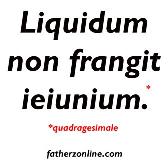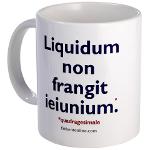From a reader…
QUAERITUR:
I know this is a bit early for Ash Wednesday and Good Friday, but I am curious (and excited about Lent). There’s a trend of putting butter into one’s coffee.
Basically it’s supposed to make you feel fuller longer and slow caffeine energy spikes. I know milk in coffee doesn’t break the fast ( not sure about honey instead of sugar), but would this break the fasting laws as well?
Firstly, it is good to be thinking about these things before Ash Wednesday. The Latin Church has two days of the year when most Catholics are obliged both the fast and to abstain from meat. While some wiggle room is allowed for the sick, or other factors, this covers the multitude. Since we have so few obligations as Catholics, it’s good to get them right.
To review, and this will come up again before Lent…
FASTING: Catholics who are 18 year old and up, until their 59th birthday (when you begin your 60th year), are bound to fast (1 full meal and perhaps some food at a couple points during the day, call it 2 “snacks”, according to local custom or law – two snacks that don’t add up to a full meal) on Ash Wednesday and Good Friday.
There is no scientific formula for this. Figure it out.
ABSTINENCE: Catholics who are 14 years old and older are abound to abstain from meat on Ash Wednesday and on all Fridays of Lent, and Good Friday in the Triduum.
In general, when you have a medical condition of some kind, or you are pregnant, etc., these requirements can be relaxed.
You would do well to include works of mercy, both spiritual and corporal.
I also recommend making a good confession. Let me put that another way:
GO TO CONFESSION!
“But Father! But Father!”, some of you are saying anxiously, “What about my Mystic Monk Coffee? I can drink my Mystic Monk Coffee, can’t I? Can’t I? And can I put butter in it?!?”
Yes, you can have coffee and, yes, you can put butter in your coffee, as part of your full meal and two “snacks”(portions that wouldn’t make a full meal). There isn’t that much difference between putting cream in coffee and putting butter in coffee. Cream is milk with 30-55 percent of milkfat and is still liquid. Butter is a semisolid form of milk with 80 percent milkfat. Put a little of either one into coffee (presumably hot) and they dissolve into the coffee.
 How about in between?
How about in between?
The old axiom, for the Lenten fast, is “Liquidum non frangit ieiunium … liquid does not break the fast”, provided you are drinking for the sake of thirst, rather than for eating.
Common sense suggests that chocolate banana shakes or “smoothies”, etc., are not permissible, even though they are liquid in form. They are not what you would drink because you are thirsty, as you might more commonly do with water, coffee, tea, wine in some cases, lemonade, sports drinks such as “Gatorade”, etc.
Again, common sense applies, so figure it out.
Drinks such as coffee and tea do not break the Lenten fast even if they have a milk (cream, butter) added, or a bit of sugar, or fruit juice, which in the case of tea might be lemon.
Coffee would break the Eucharistic fast (one hour before Communion), since – pace fallentes – coffee is no longer water, but it does not break the Lenten fast on Ash Wednesday or Good Friday.
If you want to drink your coffee and tea with true merit I suggest drinking it from one of my coffee mugs.
There’s always the Liquidum non frangit ieiunium mug.



































The legalist approach of RCs to matters of fasting never ceases to amaze. An hour before communion? Butter during Lent? Any liquids OK? Sheesh. Make it a sacrifice, folks.
[You just won the coveted “Luke 18:11 Award”. If you, a non-Catholic, have something interesting or constructive to say, say it in an interesting and constructive way. Otherwise, keep it to yourself.]
AUTOPHAGY google it.
For over 2000 years Holy Mother Church has told her children; “Fast”, it’s good for you on so many levels. In 2016 the Nobel Prize in Medicine went to Japanese Dr. Yoshinori Ohsumi for his work on the dynamic cellular recycling process that happens while we fast, “Autophagy” or self-eating.
Basically by self denial of food, on a cellular level many bad harmful things that your cells are caring around, molds, fungus and nasty bacteria are cleaned away. Like a garbage disposal.
So once again, Science has recently confirmed what the Church has always taught.
Brightwood,
That’s interesting. I have health issues that resolve during Lent. My fast is initially water, and then after a day or so it becomes bread and water for several days. Then it transitions to the regular fast prescribed by the Church.
We Catholics provide a useful diversion to the Orthodox to keep them from attacking each other.
[And yet, somehow, they never stop doing so.]
It is interesting that so many people (of all faiths and none) these days are taking up some form of “intermittent fasting” for the health benefits and self-improvement. Not so long after the Church relaxed the fasting rules, perhaps thinking them outdated and unacceptable to people in the modern day.
See also how the Church (in some jurisdictions) got rid of Friday abstinence, only for “meat-free Mondays” to catch on in secular society.
Or the (often atheist) young men pledging to give up pornography and related behaviours, having realised the harm they do, when many in the Church are urging laxity about sexual morality.
Or the way we got rid of silence and musical styles conducive to contemplative prayer at Mass, only for people to flock to yoga and Buddhist meditation/mindfulness. Or threw out the traditional visual and sensory aids to devotion in favour of minimalist churches, an austerely intellectual approach to faith, and a “wordy” liturgy – just as the value of non-verbal communication and visual/kinesthetic learning styles started to emerge.
We really should have trusted the Church and her traditions, even if we didn’t fully understand them.
—“Catholics who are 18 year old and up, until their 59th birthday…”—
Hokey-smokes, Bullwinkle! You’re saying this is my last year of ‘proper fasting’ for Lent?! Funny, I don’t feel like I need a more lax mortification (thanks be to Our Lord). Faggetaboutit.
I’ve actually been on meatless Wednesdays in addition to Fridays for about a year. I have found that the double-skipping from meat causes a greater disruption in planning the week’s meals so-as-to become a more worthy sacrifice.
Butter in coffee is an abomination to God and should never be done, neither during nor outside Lent…
I agree with Deacon Nicholas, though. A minimalist approach to fasting is no fasting at all. Of course, I don’t use that argument to attack the Church, but the “Paul VI Lent” (Paenitemini) is so minimalist that it doesn’t really count as fasting in my book. Abstinence and fasting only on 2 days (or 2 days each week) is really the bottom-line.
BrionyB is completely right. The Church relaxed her rules for fasting because it was seen as inacceptable to Modern Man (TM), and soon after that a health trend called “fasting” started, to “detox” the body (whether that is bogus or not, I do not know). Now more and more people incorporate some type of fasting during Lent, but as a part of their New Age mentality. The Church has largely abandoned any kind of fasting, and the secular world has taken it up. That reminds me of the MET Gala. When the Church (or big parts of her) abandon traditional vestments and, yes, the splendor of the liturgy, the secular world just swoops in and takes it up, and thus we have homosexuals and secular celebrities dressed in the most magnificent vestments.
That is fully in accord with something C. S. Lewis once said (I believe it was him). Although I cannot reproduce the quote literally, the meaning went along the lines of: “As soon as the Church abandons a practice, the world takes it up.”